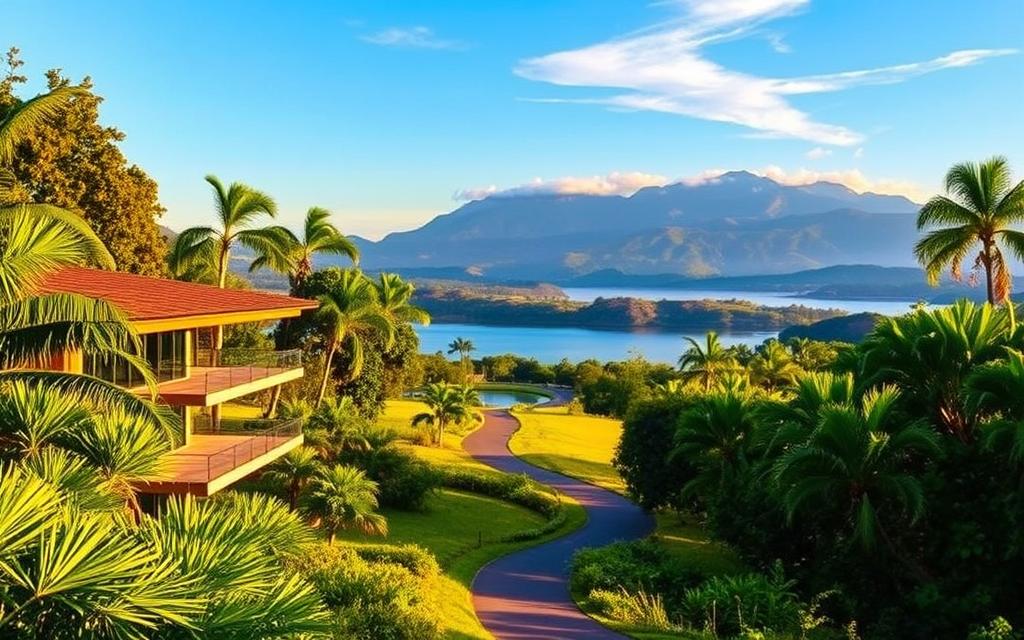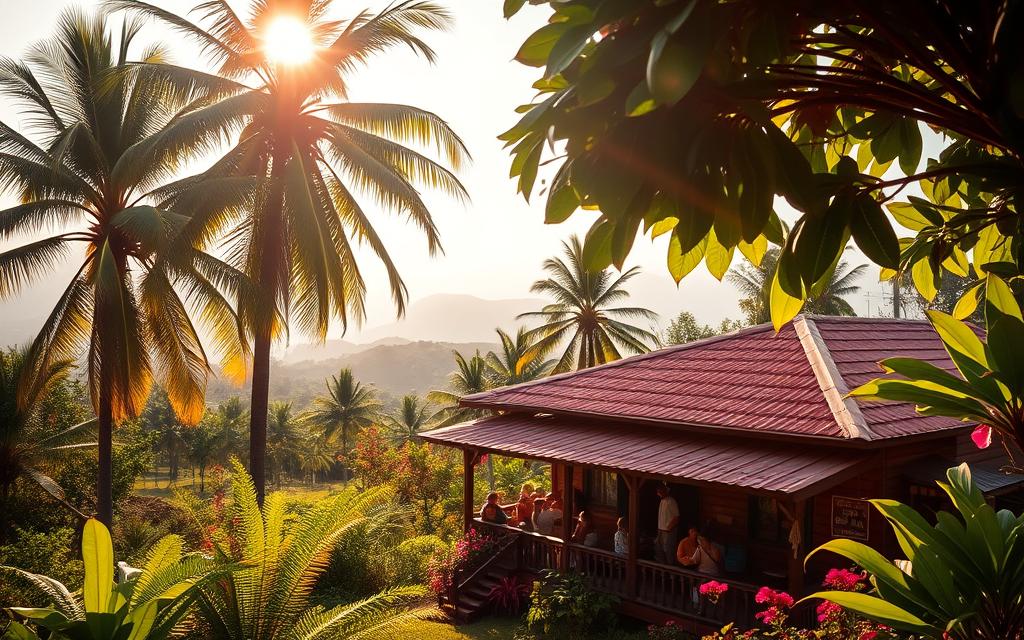Is It Hard to Get Costa Rica Residency? | JARO SCR

Did you know over 100,000 foreigners call Costa Rica home? This tropical paradise is not just a vacation destination but a place many choose to live permanently. With its stunning natural beauty, pleasant climate, and vibrant culture, Costa Rica offers a unique quality of life that attracts people from around the globe.
Residency in this Central American country opens doors to numerous benefits. From access to affordable healthcare to the ability to open a bank account, becoming a resident simplifies daily life. The government offers various residency paths, including options for pensioners, investors, and those with steady income.
Navigating the application process requires attention to detail. Proper documentation, such as a birth certificate and proof of income, is essential. Our team at JARO SCR is here to guide you every step of the way, ensuring a smooth and successful application.
Why Choose Residency in Costa Rica?

Living in Costa Rica means embracing a life of balance, adventure, and tranquility. This Central American gem is renowned for its stunning landscapes, vibrant culture, and welcoming environment. Whether you’re drawn to its lush rainforests, pristine beaches, or serene countryside, the country offers a lifestyle that’s both fulfilling and relaxing.
Costa Rican Lifestyle and Natural Beauty
Costa Rica’s natural beauty is unparalleled. From the dense rainforests of Monteverde to the golden sands of Manuel Antonio, the country is a paradise for outdoor enthusiasts. Hiking, surfing, and wildlife spotting are just a few activities that make life here exciting. The Pura Vida philosophy, which translates to “pure life,” reflects the locals’ approach to living with gratitude and simplicity.
The tropical climate ensures warm weather year-round, making it ideal for those who love the outdoors. This, combined with the country’s commitment to sustainability, creates an environment where nature and community thrive together.
Quality of Life and Welcoming Environment
Costa Rica is known for its high quality of life. The healthcare system is accessible and affordable, with the Caja Costarricense de Seguro Social (CCSS) covering all residents. Education is another strong point, with one of the highest literacy rates in Central America.
The welcoming environment extends beyond the infrastructure. Locals are friendly and open, making it easy for newcomers to feel at home. Whether you’re a retiree, a digital nomad, or a family, the country offers a supportive community and a peaceful way of life.
Choosing residency here means gaining access to a lifestyle that prioritizes well-being, adventure, and connection. It’s no wonder so many people are drawn to call Costa Rica home.
Exploring Costa Rica Residency Options
Costa Rica offers diverse residency options tailored to different lifestyles and financial situations. Whether you’re seeking a temporary stay or long-term settlement, understanding the available paths is essential. Each program has unique requirements and benefits, making it important to choose the one that aligns with your goals.
Rentista Residency Explained
The Rentista visa is ideal for individuals with stable foreign income. Applicants must demonstrate a guaranteed monthly income of at least $2,500 or a $60,000 bank deposit. This option is perfect for those who don’t plan to work locally but want to enjoy the benefits of living in Costa Rica.
Proper documentation, such as proof of income and a birth certificate, is crucial for a successful application. Working with a local lawyer can simplify the process and ensure all requirements are met. This visa is a great way to experience the country’s lifestyle without the need for significant investments.
Investor and Permanent Residency Paths
For those looking to invest, the Investor visa requires a minimum of $150,000 in real estate or local businesses. This path not only grants residency but also opens doors to economic opportunities in the country. It’s a popular choice for entrepreneurs and property buyers.
After three years of temporary residency, applicants can apply for permanent status. This step requires maintaining compliance with all legal obligations. Permanent residency offers long-term stability and access to national healthcare and social security programs.
Choosing the right residency option depends on your financial situation and personal goals. For more details, explore our guide on Costa Rica residency benefits. Our team is here to help you navigate the process with confidence.
Is it hard to get Costa Rica residency?

The journey to residency in Costa Rica can present unique challenges for applicants. While the process is straightforward with proper preparation, common hurdles often arise. Understanding these obstacles and how to address them is crucial for a successful application.
Common Challenges in the Application Process
One of the primary challenges is gathering and legalizing required documents. Birth certificates, proof of income, and police records must be up-to-date and translated into Spanish in Costa Rica. Incomplete paperwork can lead to delays or rejection.
Another hurdle is meeting strict financial criteria. For example, Rentista applicants must show a guaranteed monthly income of $2,500. Investors need to commit at least $150,000 to local businesses or property. These requirements can be daunting without proper planning.
Inconsistencies between consulate procedures can also create confusion. Each consulate may interpret residency laws differently, leading to varied expectations. This makes it essential to stay informed and work with experts familiar with the process.
Overcoming Barriers with Proper Guidance
Expert legal advice can simplify the application process. A Costa Rican lawyer ensures all documents meet government standards and helps navigate consulate-specific requirements. This reduces the risk of errors and delays.
Systematic preparation is another key to success. Applicants should start by reviewing the residency requirements and creating a checklist. This proactive approach minimizes last-minute stress and ensures a smooth experience.
While challenges exist, proper preparation and expert support make the process manageable. With the right guidance, achieving residency in this beautiful country is within reach.
Step-by-Step Guide to the Application Process

Applying for residency in Costa Rica involves a clear, step-by-step process that ensures success when followed carefully. The journey begins with obtaining a provisional visa and continues with registration at the immigration department. Understanding each stage helps applicants prepare effectively.
Obtaining the Provisional Visa
The first step is securing a provisional visa from a Costa Rican consulate. This visa allows entry into the country for residency purposes. Applicants must prepare essential documents, including a birth certificate, proof of income, and a police record. These papers must be translated into Spanish and legalized.
Once approved, applicants have 60 days to enter Costa Rica. This timeline is critical to avoid delays. Working with a local lawyer can streamline the process, ensuring all requirements are met accurately.
Registration and Migración Requirements
After arriving in the country, the next step is fingerprint registration. This is done at the immigration department, known as Migración. Applicants must also submit their residency application during this visit. Properly translated and legalized documents are essential for a smooth process.
Deadlines are strict, so staying organized is key. Missing a step can lead to delays or rejection. Following a systematic approach simplifies what might seem like a complicated process.
With the right preparation and guidance, achieving residency in Costa Rica becomes a manageable and rewarding experience.
Document Requirements and Legal Procedures
Understanding the document requirements is crucial for a smooth residency application. Proper preparation ensures that your application meets all legal standards and avoids unnecessary delays.
Gathering and Legalizing Key Documents
Several essential documents are required for a residency application. These include a birth certificate, police clearance, proof of income, and marriage certificate if applicable. Each document must be recent, typically issued within the last six months.
Documents must be notarized and translated into Spanish by a certified translator. Additionally, they need to be authenticated through an Apostille or legalized at a Costa Rican consulate. This process ensures that the documents are recognized by the government.
For example, a birth certificate must include an Apostille from the issuing country. Police records should also be authenticated to confirm a clean criminal history. Proof of income, such as bank statements or pension letters, must demonstrate financial stability.
Submitting a complete and precise document package expedites the review process. Missing or improperly prepared documents can lead to delays or rejection. Working with a local lawyer ensures that all requirements are met accurately.
Professional assistance simplifies navigating these procedural nuances. Lawyers familiar with Costa Rican immigration law can guide you through notarization, translation, and authentication. This support minimizes errors and ensures a seamless application experience.
For more details on dual citizenship requirements, visit our guide on Costa Rica dual citizenship. Proper preparation and expert guidance make achieving residency in this beautiful country a manageable process.
Navigating Costa Rican Immigration Law
Navigating Costa Rican immigration law requires a clear understanding of legal obligations and procedures. The process involves multiple steps, from submitting documents to meeting specific criteria. Proper preparation ensures a smooth experience and avoids unnecessary delays.
Understanding Legal Obligations and Consulate Procedures
The legal framework for residency applications in Costa Rica is comprehensive. Applicants must meet specific requirements, such as providing proof of income or making an investment. These obligations vary depending on the type of visa being pursued.
Consulates play a crucial role in the initial stages of the application process. They issue provisional visas and verify documents before applicants enter the country. Each consulate may have slightly different procedures, so it’s essential to stay informed about their specific requirements.
Once in Costa Rica, the immigration department takes over. Applicants must register their fingerprints and submit their residency application. This step involves strict deadlines and precise documentation. Missing a deadline or submitting incomplete paperwork can lead to delays or rejection.
Legal obligations continue even after residency is granted. Residents must maintain valid documentation and renew their status periodically. Understanding these responsibilities ensures compliance with Costa Rican law and avoids potential issues.
Working with a knowledgeable lawyer simplifies the process. Legal experts can clarify requirements, assist with document preparation, and ensure compliance with all regulations. Their guidance is invaluable for navigating the complexities of immigration law.
Clear knowledge of the law benefits applicants throughout their residency journey. It helps avoid common pitfalls and ensures a successful application. Seeking professional advice is highly recommended to meet all legal criteria and achieve long-term stability in Costa Rica.
Benefits of Being a Resident in Costa Rica
Costa Rica’s residency program offers more than just legal status—it opens doors to a life of well-being and opportunity. From affordable healthcare to a welcoming community, the advantages are numerous. Residents enjoy a high quality of life in a country known for its safety, natural beauty, and relaxed pace.
Access to Health Insurance and Social Security
One of the most significant benefits of residency is access to the Caja Costarricense de Seguro Social (CCSS). This national health insurance system provides comprehensive coverage for residents. Medical services, including doctor visits and hospital stays, are affordable and accessible.
Social security benefits also extend to retirement and disability programs. These systems ensure long-term financial stability for residents. The low cost of living further enhances the appeal, making it easier to enjoy a comfortable lifestyle.
Embracing the Pura Vida Lifestyle
The Pura Vida philosophy, meaning “pure life,” is at the heart of Costa Rican culture. It emphasizes gratitude, simplicity, and enjoying the present moment. Residents often find themselves adopting this mindset, leading to a more relaxed and fulfilling life.
The country’s commitment to sustainability and environmental protection creates a peaceful atmosphere. Community amenities, such as parks and recreational facilities, enhance daily living. Educational services are also highly regarded, contributing to a well-rounded lifestyle.
Long-term residency offers more than financial perks—it fosters personal well-being and community integration. Whether you’re retiring, working remotely, or raising a family, Costa Rica provides a secure and enriching environment.
Financial and Investment Considerations for Residency
Financial considerations play a pivotal role in obtaining residency in this Central American country. Meeting specific investment thresholds and providing proof of stable income are essential steps. Proper planning ensures a smooth application process and long-term stability.
Minimum Investment Requirements and Proof of Income
For those pursuing an investor visa, a minimum investment of $150,000 is required. This can be in real estate, businesses, or other approved categories. Real estate investments are particularly popular due to the country’s thriving tourism industry.
Rentista applicants must demonstrate a fixed income of at least $2,500 per month or a $60,000 bank deposit. Pensionado applicants need a lifelong pension of $1,000 monthly. These financial thresholds ensure applicants can support themselves without local employment.
Strategic Financial Planning for Long-Term Residency
Strategic planning is crucial for meeting residency requirements. Applicants should prepare detailed financial documents, including bank statements and investment proofs. Consulting with financial experts can help navigate these requirements effectively.
Long-term residency often leads to permanent status after three years. Maintaining compliance with financial obligations is key. For more insights, explore our guide on Costa Rica investor visa success stories.
Sound financial planning not only meets residency criteria but also ensures a secure future in this beautiful country. With the right preparation, achieving residency becomes a manageable and rewarding journey.
Expert Tips for a Successful Residency Application
Securing residency in Costa Rica requires careful planning and expert guidance. The process involves multiple steps, from gathering documents to meeting financial criteria. With the right approach, applicants can navigate the system efficiently and avoid common pitfalls.
Hiring a Costa Rican Lawyer or Consultant
Professional legal advice is invaluable for a smooth application. A Costa Rican lawyer ensures all documents meet government standards and helps navigate consulate-specific requirements. This reduces the risk of errors and delays.
Experienced consultants provide tailored guidance based on your residency type. Whether you’re applying as an investor or a retiree, their expertise ensures compliance with all legal obligations. This investment saves time and minimizes stress.
Staying Updated with Immigration Policy Changes
Immigration laws can change frequently, impacting application requirements. Regularly checking official websites and consulting experts ensures you stay informed. This proactive approach helps avoid last-minute surprises.
For example, recent updates to the Rentista program now require proof of income for two consecutive years. Staying updated with such changes ensures your application remains on track. Expert guidance is essential for navigating these updates effectively.
By following these tips and working with professionals, you can streamline your residency application. Proper preparation and expert support make the process manageable and increase your chances of success.
Conclusion
Costa Rica’s welcoming environment and diverse residency programs make it an attractive destination for many. Whether you’re drawn by the Rentista, Investor, or Pensionado visa, each path offers unique opportunities tailored to your financial situation and lifestyle goals.
While the process involves gathering specific documents and meeting financial criteria, expert guidance ensures a smooth experience. Proper preparation and legal support minimize challenges, making residency an achievable goal.
Becoming a resident opens doors to a high quality of life, affordable healthcare, and the Pura Vida philosophy. For those considering dual citizenship in Costa Rica, the benefits extend even further.
We’re here to help you every step of the way. Contact us at info@jaroscr.com or +(506) 71828969 to start your journey today.


